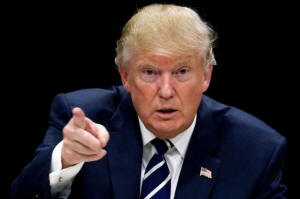|
Exclusive: Trump team seeks agency
records on border barriers, surveillance
 Send a link to a friend
Send a link to a friend
 [January 03, 2017]
By Julia Edwards Ainsley [January 03, 2017]
By Julia Edwards Ainsley
WASHINGTON (Reuters) - In a wide-ranging
request for documents and analysis, President-elect Donald Trump's
transition team asked the Department of Homeland Security last month to
assess all assets available for border wall and barrier construction.
The team also asked about the department's capacity for expanding
immigrant detention and about an aerial surveillance program that was
scaled back by the Obama administration but remains popular with
immigration hardliners. And it asked whether federal workers have
altered biographic information kept by the department about immigrants
out of concern for their civil liberties.
The requests were made in a Dec. 5 meeting between Trump's transition
team and Department of Homeland Security officials, according to an
internal agency memo reviewed by Reuters. The document offers a glimpse
into the president-elect's strategy for securing the U.S. borders and
reversing polices put in place by the Obama administration.
Trump's transition team did not comment in response to Reuters
inquiries. A spokeswoman for the Department of Homeland Security and
U.S. Customs and Border Protection declined to comment.

In response to the transition team request, U.S. Customs and Border
Protection staffers identified more than 400 miles along the U.S.-Mexico
border, and about the same distance along the U.S.-Canada border, where
new fencing could be erected, according to a document seen by Reuters.
Reuters could not determine whether the Trump team is considering a
northern border barrier. During the campaign, Trump pledged to build a
wall and expand fencing on parts of the U.S.-Mexico border but said he
sees no need to build a wall on the border with Canada.
One program the transition team asked about, according to the email
summary, was Operation Phalanx, an aerial surveillance program that
authorizes 1,200 Army National Guard airmen to monitor the southern
border for drug trafficking and illegal migration.
The program once deployed 6,000 airmen under President George W. Bush
but was downsized by Barack Obama, a move blasted by some conservatives
who argue the surveillance is vital to border security.
POLICY SHIFT
The transition team also asked for copies of every executive order and
directive sent to immigration agents since Obama took office in 2009,
according to the memo summarizing the meeting.
Trump has said he intends to undo Obama's executive actions on
immigration, including a 2012 order to allow children brought to the
U.S. illegally by their parents to remain in the country on temporary
authorizations that allow them to attend college and work.

The program, known as DACA, collected information including
participants' addresses that could theoretically be used to locate and
deport them if the policy is reversed. Another request of the transition
team was for information about whether any migrant records have been
changed for any reason, including for civil rights or civil liberties
concerns, according to the internal memo seen by Reuters.
[to top of second column] |

Republican presidential nominee Donald Trump appears at a campaign
roundtable event in Manchester, New Hampshire, U.S., October 28,
2016. REUTERS/Carlo Allegri/File Photo

A Department of Homeland Security official, speaking on condition of
anonymity, said the agency interpreted the request to mean the
transition team wanted to make sure that federal workers were not
tampering with information to protect DACA recipients and other
migrants from deportation.
On the campaign trail, Trump vowed to deport more undocumented
immigrants, a promise that may have prompted the transition team's
request for information about the feasibility of expanding temporary
detention facilities.
The internal memo summarizing the meeting between Trump's transition
team and U.S. Customs and Border protection said the team had
requested a comprehensive picture of border security as well as
resources available for walls and barriers.
The Department of Homeland Security official said agency
representatives who attended the meeting believed the request to
include both the northern and southern borders. U.S. Customs and
Border Protection then prepared a report on specific locations and
costs of building a fence along the U.S.-Canada border.
Reuters reviewed a copy of the report, which estimated the cost of
building fencing along the northern border fence would be $3.3
billion and cover 452 miles along border of Canada and the states of
Washington, Idaho, Montana, New York, Vermont, New Hampshire and
Maine.
Adding 413 miles of fencing on the southwest border would be more
expensive, according to the estimate of $11.37 billion, because it
would be aimed at keeping pedestrians as well as vehicles from
crossing.

Pedestrian fences require more staff and would cost $11.2 million
per mile versus $4.1 million per mile to build to build, according
to the report.
In fiscal year 2015, the latest year for which data is available,
border patrol agents apprehended 2,626 illegal migrants on the
U.S.-Canada border compared to 331,333 apprehended on the
U.S.-Mexico border.
(Reporting by Julia Edwards Ainsley; Editing by Sue Horton and Brian
Thevenot)
[© 2017 Thomson Reuters. All rights
reserved.]
Copyright 2017 Reuters. All rights reserved. This material may not be published,
broadcast, rewritten or redistributed. |